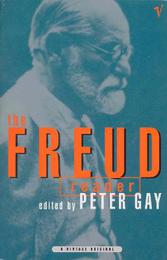
|
The Freud Reader
Paperback / softback
Main Details
| Title |
The Freud Reader
|
| Authors and Contributors |
By (author) Peter Gay
|
| Physical Properties |
| Format:Paperback / softback | | Pages:880 | | Dimensions(mm): Height 198,Width 129 |
|
| Category/Genre | Literary essays |
|---|
| ISBN/Barcode |
9780099577119
|
| Classifications | Dewey:150.1952 |
|---|
| Audience | | General | | Professional & Vocational | |
|---|
|
Publishing Details |
| Publisher |
Vintage Publishing
|
| Imprint |
Vintage Classics
|
| Publication Date |
4 May 1995 |
| Publication Country |
United Kingdom
|
Description
Freudian thought permeates many aspects of 20th-century life, and to understand Freud is to explore not only his scientific papers but also his writings on art, literature, politics, religion and culture. Containing 51 texts which span Freud's entire career, from early case histories, through his work on dreams and essays on sexuality, and on to his late writings (including "Civilisation and Its Discontents"), this book brings together his ideas as a scientist, humanist, doctor and philosopher. Introductions to the texts are provided by Peter Gay, who has also written a general introduction which places the man and his work in the context of his time and culture.
Author Biography
Peter Gay's first volume of his two-volume work, The Enlightenment- An Interpretation, won a National Book Award, and his bestselling Freud- A Life for Our Time was finalist for the National Book Award. His other numerous works include studies on the eighteenth century, Voltaire's Politics and The Party of Humanity, and essays on the writing of history, Style in History and Art and Act. The recipient of Guggenheim and Rockefeller Foundation Fellowships, and Overseas fellowship at Churchill College, Cambridge, and the Heineken Prize for Historical Study, Peter Gay is Sterling Professor of History at Yale University.
Reviews"[Freud] was possessed of exceptional literary gifts. There can be no question that he was a great writer: to read him is to be beguiled by him... His influence on all of us was enormous, and it would be as impossible to return to a pre-Freudian way of thinking as to return to a pre-heliocentric theory of the solar system" The Times
|